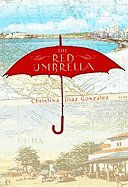
Christina Diaz Gonzalez's moving and inspiring debut novel is a mosaic of subtle shifts in the life of one teenage girl, set against a backdrop of political extremes in 1961 Cuba. The book's events cover just shy of a year, and it opens with 14-year-old narrator Lucía on the beach with her seven-year-old brother, Frankie, as they watch a white heron migrate north and she realizes, "It was time for us to go, too." It is May 2, 1961, the day Castro ruled out elections in Cuba, and a line of army trucks passes the siblings as they make their way home. The next day, their father's boss is arrested at the bank. Then Lucía's best friend, Ivette, becomes involved with the Jóvenes Rebeldes ("Since when do you go to those meetings?... Aren't you the one who says it's more important to change your nail polish than change the government?" Lucía asks Ivette). At first, Lucía thinks her parents are being too protective, not letting her join Ivette at the meetings. But when Lucía discovers their kind-hearted pharmacist hanged in a public park for attempting to stage a peaceful protest, she is deeply shaken, and begins to question the motives behind the movement. Another pivotal scene involves soldiers' discovery of a secret cache of Lucía's family's few belongings. Could Ivette have betrayed Lucía?
Gonzalez smoothly combines her heroine's painful coming-of-age with a country's bitter awakening to Castro's larger agenda. Teenagers were expected to leave their families and join brigades across the countryside, "getting rid of gusanos"--antirevolutionaries. Lucía's parents make the wrenching decision to send Frankie and Lucía to the United States alone, with the hope of obtaining visas and following them afterward. "Operation Pedro Pan," the author's note explains, "was the largest exodus of unaccompanied children ever in the history of the Western Hemisphere." The people who help Lucía and Frankie along the way are kind, and yet Gonzalez makes us keenly aware of all that they have left behind--the aroma of café con leche at breakfast, "the music that would surprise your ears as you passed by an open window," their parents' loving embrace. The pacing of events is at times uneven, but the placement of details reads like poetry--the leitmotifs of the white heron, Abuela's diamond earrings, and the titular red umbrella. By focusing on one family's experience, Gonzalez allows readers to view the sacrifices made by an entire population, and understand the courage it takes to leave everything you know, believing you can know something better.--Jennifer M. Brown

